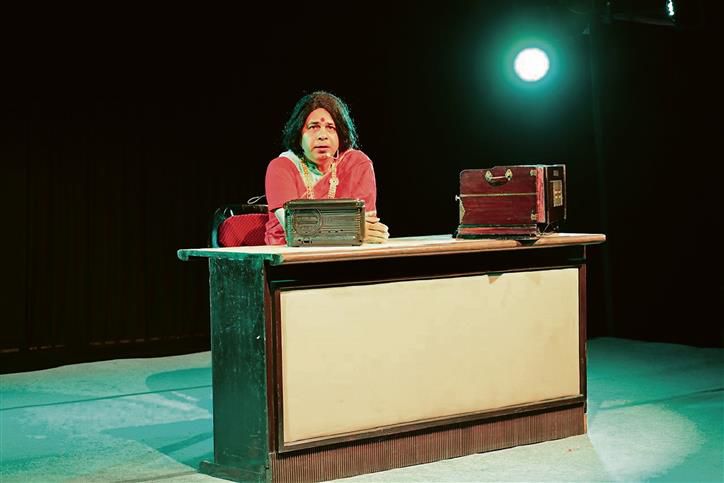‘Gunno Bai’, NSD chief’s solo act
Malvika Kaul
It’s been almost six months since Chittaranjan Tripathy became director of the National School of Drama (NSD). An ex-student of India’s premier theatre training institute, Tripathy continues to have mixed feelings about his role as the NSD head. “NSD has a golden legacy,” he says. Stepping into the shoes of some of the famous directors of NSD (Ebrahim Alkazi, BV Karanth, Ratan Thiyam, Ram Gopal Bajaj) can be burdensome. Tripathy is also overwhelmed — this is his moment to contribute to his alma mater and give it fresh direction.
Tripathy hopes to be the “Renaissance man” — looking for inspiration from ‘Natya Shastra’, the ancient Sanskrit text focused on drama, music, dance and other performing arts. The treatise offers the building blocks of theatre, he declares. It establishes the timelessness and prowess of Indian theatre. He believes that the NSD ignored this Indian treasure all these years and now the drama school has imbibed its rich heritage and aesthetics. Tripathy is also excited about opening regional repertories; introduce more meaningful partnerships with organisations and individuals outside the NSD; start a BEd programme in theatre, and invest in the scholarship of child psychology and theatre education. In the turbulent world of Artificial Intelligence, he dreams of creating a niche for Artistic Intelligence.
Originally from Odisha, Tripathy studied sociology before joining the NSD. One of his most successful productions has been ‘Taj Mahal Ka Tender’, a satire challenging the political history of humans and corruption in a government system. He also learnt music, an art he hopes the NSD will excel in and eventually stage some musicals.
Tripathy’s recent success, ‘Gunno Bai’, a solo presentation, is a theatrical exploration of a man (Ghanshyam Pathak) who comes to Delhi to study and become an IAS officer. The city is harsh. His father is a fugitive connected to a suspected case of caste violence. Ghanshyam has to take a series of tuitions to survive and there is no time to prepare for any examination. The narrative arc of Gunno is similar to thousands of aspirants who spend precious years of their lives trying to crack the civil services or other competitive exams. Many do not even qualify for the first round of an all-India exam as poverty and exploitation prevent them from achieving their dreams.
But Tripathy’s Gunno Bai is not a failure. He does not make it to the civil services, but becomes famous for his music and rhetoric. During a walk at the India Gate lawns, he discovers the appeal of a man performing while dressed in a saree. People shower the performer with money, and Gunno cracks the formula to earn a living with ease. He now dresses often in feminine attire — part eunuch, bit of a man and bit of a woman. No more sleeping empty stomach and lamenting why he ran away to Delhi. Instead, this young man from a village in Bihar gains popularity after a leading newspaper features him reciting Kabir and other established poets. He soon becomes the go-to person if you want to listen to great poetry or have philosophical discussions. Gunno is now part of the Page 3 circuit!
A large part of the solo show blends music, poetry and humour but is actually a satire on our times, where the quest for goals is blinding and often breaks the human spirit. Tripathy has written the play and also composed all the songs. If the production budget is promising, he says he is assisted by a group of musicians for the stage performance. But, on a shoe-string budget, Tripathy is a one-man army, travelling with all props and dresses in a suitcase, with only a local tabla player to assist. Of course, this time he stages a shorter version of the play for the audience.
‘Gunno Bai’ has already had 100 shows, including a recent one at the Central Academy of Drama in Beijing in May. After every performance, Tripathy faces similar comments and queries: “Is this your story?” “I know someone who faced a similar struggle.” Tripathy says the play relates to the experiences and emotions of several people. And this, he adds, is the key to its success both within India and abroad. The story of a village boy in search of a dream that does not materialise, but exposes him to the harsh and tragic realities of life and forces him to negotiate his space, identity and survival, is indeed a compelling narrative.
For Tripathy, theatre is a means towards a larger goal of social transformation. The world is a stage and he is playing many parts.









